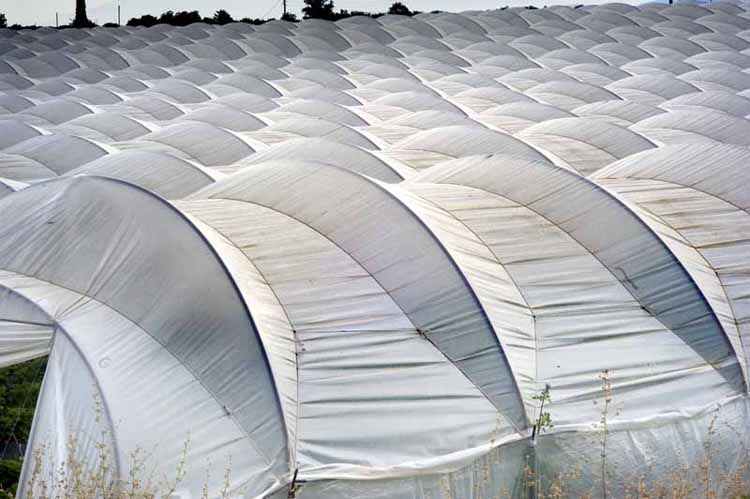
![]() Op 17 april 2013
openden drie voormannen van de grootste Griekse aardbeienproducent het vuur op een groep stakende
aardbeienplukkers uit Bangladesh in het stadje Neo Manolada in het westen van de Peloponnesos.
De ongedocumenteerde arbeiders eisten 6 maanden achterstallig loon. 35 Mensen werden gewond,
enkelen waren er enstig aan toe.
Op 17 april 2013
openden drie voormannen van de grootste Griekse aardbeienproducent het vuur op een groep stakende
aardbeienplukkers uit Bangladesh in het stadje Neo Manolada in het westen van de Peloponnesos.
De ongedocumenteerde arbeiders eisten 6 maanden achterstallig loon. 35 Mensen werden gewond,
enkelen waren er enstig aan toe.
De drie schutters en hun werkgever Nicos Vangelatos werden gearresteerd op beschuldiging van mensenhandel, illegaal wapenbezit en het overtreden van arbeidswetten. Een jaar later behandelde de rechtbank in Patras de zaak - voor het eerst in de Griekse geschiedenis dat een rechtbank een zaak van mensenhandel aan de orde stelde.
Samen met de advokaat van de migranten Vasilis Kerasiotis en zijn assistent van de Greek Council for Refugees (GCR), reisde fotograaf Piet den Blanken in de periode vóór het proces naar Manolada om de leef en werkomstandigheden van de werkers in de aardbeienvelden te documenteren.
Op 30 juli toonde het Griekse recht haar ware gezicht toen de rechtbank van twee van de beschuldigden - inclusief Vangelatos - de aanklacht wegens mensenhandel liet vallen. De twee andere mannen, degenen die de schoten afvuurden, werden veroordeeld tot gevangenisstraffen van 14 en 8 jaar maar voorwaardelijk vrijgelaten nadat ze tegen de veroordeling in beroep gingen.

![]() On April 17th 2013, in the small
Greek town of Nea Manolada in Western Peloponnese, three foremen of one of the country's largest strawberry companies
opened fire on a crowd of striking Bangladeshi workers who were demanding six months’ worth in outstanding wages.
Thirty-five men were wounded and several were in critical condition.
On April 17th 2013, in the small
Greek town of Nea Manolada in Western Peloponnese, three foremen of one of the country's largest strawberry companies
opened fire on a crowd of striking Bangladeshi workers who were demanding six months’ worth in outstanding wages.
Thirty-five men were wounded and several were in critical condition.
The three shooters and their employer Nicos Vangelatos were arrested on charges of labor trafficking, illegal possession of firearms, and breaches of employment laws. A year later, a court in Patras took over the case -- this was the first time in the history of Greek jurisprudence that the issue of labor trafficking was brought to the table.
As shocking videos and witness accounts of the aftermath revealed conditions akin to modern slavery, calls for boycott of the “blood strawberries” were circulating online, which soon caught the attention of the international media. Hopes were high that the trial would finally bring justice to the countless victims of racist violence.
Together with migrants' lawyer Vasilis Kerasiotis and his assistant from the Greek Council for Refugees, photographer Piet den Blanken headed to Manolada a few days prior the trial on June 6th to document the workers' living and working conditions in the strawberry fields. Staying in makeshift camps highly degrading for human dignity, workers are also forced to toil under conditions hazardous for their health.
On July 30th, however, the true side of Greek justice was exposed, when the court acquitted two of the accused — including Vangelatos — while the charges of labor trafficking were dropped. The two other men, the actual shooters, received initial sentences of over 14 and 8 years, but they were both conditionally released after appealing against the verdict.
Unfortunately, in a country already marked by rising xenophobia — as witnessed by the popularity of the neo-Nazi party Golden Dawn — the court’s decision does not come as a surprise. Powerless in the face of economic exploitation, physical abuse and institutional racism, the migrants’ value to Greek society appears to be their unremunerated labor.